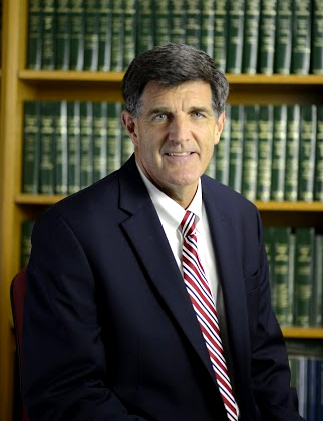Advice and News from the Chief Justice of the Housing Court
| . Posted in advice, News, policy - 0 Comments
In September, Springfield attorney Stanley Komack arranged for Chief Justice Tim Sullivan to speak at MassLandlords.net/RHAGS in Longmeadow. Here are the highlights of what “the Chief” told us.

Chief Justice Timothy Sullivan spoke in Springfield on September 8, 2016. Photograph from Massachusetts School of Law.
Last year, 116 housing court staff ran just under 42,000 case filings, resulting in the lowest per-case cost of any court in Massachusetts. Chief Justice Sullivan still sits on the bench one day each week to remain connected. He sees a lot of civility, and very seldom does he have to remind litigants to cool it.
Advice to Landlords
The Chief offered some do’s and don’ts for landlords:
- Screen tenants.
- Be open to mediation.
- Be patient. In the budget for fiscal year 2017, the courts have been level funded at $640 M. Since 2008, the courts have declined to 1,900 employees and Housing Court in particular has lost 3 housing specialists.
- Use a deputy sheriff or constable. Their signature on a notice or a summons is prima facie evidence of receipt.
- When evicting for cause, be very specific in the notice, or else the tenant won’t have a reasonable chance to defend against your allegations. Cite the time and date of whatever offense you’re claiming.
- Document move-in conditions, with or without a security deposit; photographs are key.
- You must have an attorney representing an LLC or S- or C-corporation.
- Bring photographs. Print them because in many courts, phones are not allowed.
- Non-payment claims must be supported by a ledger, especially when establishing a defense to possession; it can counter conditions claims if you show the rent was not paid.
- Post-trial, be realistic about collecting judgments; in most cases Mass General Law doesn’t allow issuing a payment order without proof of the tenants’ ability to pay. An execution for judgment on money is good for 20 years.
- Remember the 90-90 rule: after a judgment has entered, you have 90 days to get an execution; after 90 days, your execution expires; use it or you can’t get another. Note that written agreements to stay execution do pause the clock.
The Chief then described his two goals for the coming year.
Housing Court Expansion
First, he wants expansion of Housing Court jurisdiction. One-third of the state’s population is not covered by Housing Court. This includes southern Middlesex county, all of Suffolk county, a large part of Norfolk county, the cape, and islands. Last year there was a great increase in the amount of support for expansion. Legislation was filed in the senate but it died in house. Governor Baker supported it.
Housing Court expansion would create a new division around Brockton, with five judges, three in a circuit, 10 state-wide. It would cost $2.4 M. All courts would have a little change to their jurisdiction except the Western division.
The Chief Justice said that landlords and tenants would both benefit by access to the court’s greater technical understanding of the Massachusetts General Laws. He said municipalities would benefit by the receivership program to eliminate blight.
The Chief Justice then emphasized that 84% of cases in mediation come to agreement, which makes everyone happy. The Tenancy Preservation Program allows for a clinician to work with both parties to help disabled and elderly tenants.
There are currently 18 housing court locations where the court sits each week. There’s a lawyer-for-the-day program intended to be volunteer legal advice for both landlords and tenants from both bar and private attorneys.
The Chief Justice said that where landlords have a choice, 83.8% of cases are first filed in Housing Court. (The Chief mentioned this because in certain locations, among certain landlords, Housing Court is perceived to be less fair than District Court.)
Digitization
The second goal the Chief Justice talked about was digitization. Attorneys currently have a portal for certain filings. Just under 10,000 lawyers participating make 60,000 logins per month. E-access to court records is now over 100,000 searches per month across all courts, twice what it was a year ago.
They are working on a “guide and file” tech pilot, like “TurboTax for evictions”, called “access to justice,” which would allow a plaintiff to complete an interview to create a filing. They are starting with small claims, which must be printed from the computer. Later they will add an e-file capability. In 2017, they’ll be using dual paper and electronic systems, in case the electronics fail, so that they have a backup. The court is rolling out 50 scanners this year to start converting everything to digital records.
The Chief talked about how lawyers still have typewriters because the summary process summons and complaint must be typed on paper.
Landlords in the audience asked about the Worcester check-in process, which seemed to be better than the Springfield roll call process. The answer from Judge Fein, also in attendance, was to come early, at 8:30am. She said there was not enough space in Western court to change the process.
The Chief asked landlords to remember that court rooms cannot play video.
When asked about mandatory rent escrow, the Chief said it is a matter of judicial discretion and law. He was willing to change court procedures, but said he would never touch an item of judicial discretion.




